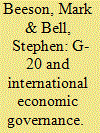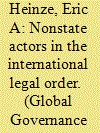|
|
|
Sort Order |
|
|
|
Items / Page
|
|
|
|
|
|
|
| Srl | Item |
| 1 |
ID:
086433


|
|
|
|
|
| Publication |
2009.
|
| Summary/Abstract |
Following the East Asian crisis of 1997-1998, much attention was paid to financial sector reform. While little of substance has changed in the intervening years, a number of potentially important new forums were established to facilitate international cooperation. By drawing on and modifying theories of hegemony, this article provides a theoretical context within which to explore one of these institutions: the Group of 20 (G-20). The key question examined is whether institutions like the G-20 are likely to provide genuine mechanisms for cooperation and inclusion or simply become instruments of "hegemonic incorporation." The argument here is that despite the continuing "structural" dominance of the international system by the United States and the Group of 7 (G7) nations, the G-20 provides some scope for other nations to influence outcomes.
|
|
|
|
|
|
|
|
|
|
|
|
|
|
|
|
| 2 |
ID:
086435


|
|
|
|
|
| Publication |
2009.
|
| Summary/Abstract |
The concept of global public goods has been advanced as a way of understanding certain transborder and global problems and the need for a coordinated international response. It has been used to describe everything from global environment, international financial stability, and market efficiency, to health, knowledge, peace and security, and humanitarian rights. Using an internal critique, this article finds that the concept is poorly defined, avoids analytical problems by resorting to abstraction, and masks the incoherence of its two central characteristics. The conclusion is that even if the concept of global public goods is effective rhetorically, precise definition and conceptual disaggregation are required to advance analysis of global issues.
|
|
|
|
|
|
|
|
|
|
|
|
|
|
|
|
| 3 |
ID:
086434


|
|
|
|
|
| Publication |
2009.
|
| Summary/Abstract |
The concern of whether nonstate actors can undertake an "armed attack" that would trigger a state's right to self-defense has acquired new prominence in the post-September 11 world. This article addresses that concern by examining the Israeli-Hezbollah conflict of July 2006. It argues that since the US invasion of Afghanistan in 2001, states have incurred an increased responsibility for the acts of nonstate actors that operate from their territory. Based on this emerging norm, the argument is that the degree of Lebanon's involvement in Hezbollah's attack against Israel was sufficient to justify the use of force in self-defense by Israel against both Hezbollah and the state of Lebanon. The conclusion is that while this is a potentially dangerous development in international law, there is reason to suggest that it may actually encourage states to prevent their territory from being used by nonstate actors to export violence.
|
|
|
|
|
|
|
|
|
|
|
|
|
|
|
|
| 4 |
ID:
086432


|
|
|
|
|
| Publication |
2009.
|
| Summary/Abstract |
The citizenship concept is not absent from UN discourse. However, the use of the term is limited to a conception of citizenship systematically associated to the state; terms such as supranational citizenship or UN citizenship are not part of the usual UN vocabulary. Does that mean that the UN is not "making citizenship" at all? The answer seems obviously positive. Considering the history of the European Union and work on European citizenship, this article demonstrates that such a response may be too hasty. Through the analysis of two institution-building processes-the creation of supranational criminal courts and the opening of UN policymaking processes-it is argued here that just as the European Union was making citizenship well before the Maastricht Treaty explicitly mentioned "European citizenship," the United Nations is beginning to engage a process of citizenization.
|
|
|
|
|
|
|
|
|
|
|
|
|
|
|
|
| 5 |
ID:
086436


|
|
|
|
|
| Publication |
2009.
|
| Summary/Abstract |
Analysts usually identify two United Nations, one composed of member states and a second composed of the secretariats. A third UN should also be recognized, composed of actors that are closely associated with the world organization but not formally part of it. This "outside-insider" UN includes nongovernmental organizations, academics, consultants, experts, independent commissions, and other groups of individuals. These informal networks often help to effect shifts in ideas, policies, priorities, and practices that are initially seen as undesirable or problematic by governments and international secretariats.
|
|
|
|
|
|
|
|
|
|
|
|
|
|
|
|
|
|
|
|
|